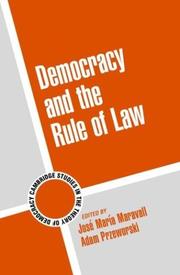| Listing 1 - 1 of 1 |
Sort by
|

ISBN: 0521532663 0521825598 1107137705 0511180748 051106246X 0511307683 0511610068 1280431083 0511204833 0511070926 9780521532662 9780511062469 9780511610066 9780521825597 Year: 2003 Publisher: Cambridge, UK ; New York, NY : Cambridge University Press,
Abstract | Keywords | Export | Availability | Bookmark
 Loading...
Loading...Choose an application
- Reference Manager
- EndNote
- RefWorks (Direct export to RefWorks)
This book addresses the question of why governments sometimes follow the law and other times choose to evade the law. The traditional answer of jurists has been that laws have an autonomous causal efficacy: law rules when actions follow anterior norms; the relation between laws and actions is one of obedience, obligation, or compliance. Contrary to this conception, the authors defend a positive interpretation where the rule of law results from the strategic choices of relevant actors. Rule of law is just one possible outcome in which political actors process their conflicts using whatever resources they can muster: only when these actors seek to resolve their conflicts by recourse to la, does law rule. What distinguishes 'rule-of-law' as an institutional equilibrium from 'rule-by-law' is the distribution of power. The former emerges when no one group is strong enough to dominate the others and when the many use institutions to promote their interest.
Rule of law --- Democracy --- Sociology of law --- Political sociology --- Self-government --- Political science --- Equality --- Representative government and representation --- Republics --- Supremacy of law --- Administrative law --- Constitutional law --- Social Sciences --- Political Science --- Rule of law - Congresses. --- Democracy - Congresses.
| Listing 1 - 1 of 1 |
Sort by
|

 Search
Search Feedback
Feedback About UniCat
About UniCat  Help
Help News
News